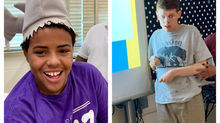A Years-Long Journey to Text-Based Communication
- Nick Barry

- Oct 29, 2024
- 2 min read

You all asked me to tell you about growing my ability to communicate with typing. Before I start, you should look at a video of me scripting.
This speech was all I had to communicate my thoughts before I met Lisa Quinn. My early memories of meeting her are sort of fuzzy because I thought she was just another good-hearted but uninformed therapist.
I wrote her off, but if you keep reading, you’ll see why I changed my mind. Here’s my story.
Memories:
Running around my living room, getting annoyed because someone was interfering with my tablet-watching.
Confused about the reason she asked me to point to letters.
But intrigued that she spoke to me like I didn’t have difficulty understanding.
Greatly hard to not type words from my scripts.
At first, I needed her to compete with my mouth words, calling out letters as I touched them and to make a constant stream of sound so I could block out the scripts and focus on my movements.
I had no problem spelling single words on the stencil, but I could not start my own thoughts.
She tried lessons on trains and dogs and storms, but I just very truly wasn’t that into them, but I had no way to tell her.
I was not making real choices yet, so when she asked me if I was bored or wanted a different topic, my stupid body betrayed me by shouting, “choose a button on the remote to begin!” and finding the closest choice with my hand.
One fine day she showed up with something about the history of Schoolhouse Rock and the wires in my brain uncrossed themselves momentarily.
We looked back at the transcript of this lesson together as we are sitting here and both had a moment.


It’s wild to see a record of the first time my real thoughts came across as intended. We made slow progress after that.
I wasn’t used to working so hard to move against my speech.
It was a literal battle to move my finger to the letter I wanted instead of the letters that made up the words in my scripts.
Her voice was like an auditory lighthouse shining the way with clear focus. I relied so much on her rhythm and tone.
Until gradually, I trained my ears to ignore my scripts so I didn't’ need to rely on her doing the work of focusing my thoughts.
Listening to my inner voice took time and so much practice. Now I prefer almost no spoken prompts since they trigger my scripts. My iPad reads my letters and my CP (communication partner) nudges me if my focus drifts too far.
This has been a years-long journey, and I’m still continuing to break down barriers to communication in my life.

Nick is just an autistic guy trying to get his big voice out. He uses text-based communication since his speech is reliably unreliable.
Want to read more of Nick's writing? You can find his stuff here on the REV blog and also at NeuroClastic.
Want to leave Nick a tip to support his work? You can donate via his Ko-Fi page



























.png)




.png)


Nick, thanks so much for this post. I often wonder what's going on in my spellers' heads (I'm an S2C PIT) and this provided invaluable insight. Much appreciation!